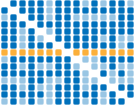A Dunánál (Hungarian)
1
A rakodópart alsó kövén ültem,
néztem, hogy úszik el a dinnyehéj.
Alig hallottam, sorsomba merülten,
hogy fecseg a felszín, hallgat a mély.
Mintha szívemből folyt volna tova,
zavaros, bölcs és nagy volt a Duna.
Mint az izmok, ha dolgozik az ember,
reszel, kalapál, vályogot vet, ás,
úgy pattant, úgy feszült, úgy ernyedett el
minden hullám és minden mozdulás.
S mint édesanyám, ringatott, mesélt
s mosta a város minden szennyesét.
És elkezdett az eső cseperészni,
de mintha mindegy volna, el is állt.
És mégis, mint aki barlangból nézi
a hosszú esőt - néztem a határt:
egykedvű, örök eső módra hullt,
színtelenül, mi tarka volt, a múlt.
A Duna csak folyt. És mint a termékeny,
másra gondoló anyának ölén
a kisgyermek, úgy játszadoztak szépen
és nevetgéltek a habok felém.
Az idő árján úgy remegtek ők,
mint sírköves, dülöngő temetők.
2
Én úgy vagyok, hogy már százezer éve
nézem, amit meglátok hirtelen.
Egy pillanat s kész az idő egésze,
mit százezer ős szemlélget velem.
Látom, mit ők nem láttak, mert kapáltak,
öltek, öleltek, tették, ami kell.
S ők látják azt, az anyagba leszálltak,
mit én nem látok, ha vallani kell.
Tudunk egymásról, mint öröm és bánat.
Enyém a múlt és övék a jelen.
Verset írunk - ők fogják ceruzámat
s én érzem őket és emlékezem.
3
Anyám kun volt, az apám félig székely,
félig román, vagy tán egészen az.
Anyám szájából édes volt az étel,
apám szájából szép volt az igaz.
Mikor mozdulok, ők ölelik egymást.
Elszomorodom néha emiatt -
ez az elmúlás. Ebből vagyok. "Meglásd,
ha majd nem leszünk!..." - megszólítanak.
Megszólítanak, mert ők én vagyok már;
gyenge létemre így vagyok erős,
ki emlékszem, hogy több vagyok a soknál,
mert az őssejtig vagyok minden ős -
az Ős vagyok, mely sokasodni foszlik:
apám- s anyámmá válok boldogon,
s apám, anyám maga is ketté oszlik
s én lelkes Eggyé így szaporodom!
A világ vagyok - minden, ami volt, van:
a sok nemzedék, mely egymásra tör.
A honfoglalók győznek velem holtan
s a meghódoltak kínja meggyötör.
Árpád és Zalán, Werbőczi és Dózsa -
török, tatár, tót, román kavarog
e szívben, mely e múltnak már adósa
szelíd jövővel - mai magyarok!
... Én dolgozni akarok. Elegendő
harc, hogy a múltat be kell vallani.
A Dunának, mely múlt, jelen s jövendő,
egymást ölelik lágy hullámai.
A harcot, amelyet őseink vívtak,
békévé oldja az emlékezés
s rendezni végre közös dolgainkat,
ez a mi munkánk; és nem is kevés. | Source of the quotation | http://mek.oszk.hu |
 |
|
By the Danube (English)
1
On the bottom step that from the wharf descends
I sat, and watched a melon-rind float by.
I hardly heard, wrapped in my destined ends,
To surface chat the silent depth reply.
As if it flowed from my own heart in spate,
Wise was the Danube, turbulent and great.
Like a man’s muscles bending at his toil,
Hammering, pitching, leaning on the spade,
So bulged and then contracted in recoil
Each wave that rippling in the current played.
It rocked me like my mother, told me a wealth
Of tales, and washed out all the city’s filth.
And drops of rain began to fall, but then,
As though their fall had no effect, they stopped.
Yet still, like one who stayed at the long rain
Out of a cave, my gaze I never dropped
Below the horizon. Endlessly to waste,
Drably like rain fell all bright things, the past.
The Danube just flowed on. And playfully
The ripples laughed at me as I reclined,
A child on his prolific mother’s knee
Resting, while other thoughts engaged her mind.
They trembled in time’s flow and in its wake
As tottering tombstones in a graveyard shake.
2.
I am he who has gazed a hundred thousand years
On that which he now sees for the first time.
One moment, and fulfilled all time appears
In a hundred thousand forbears’ eyes and mine.
I see what they could not because they must
Drag hoes, kill and embrace, for this enrolled,
And they, who have descended into dust
See what I do not, if the truth be told.
We know each other as sorrow and delight.
I, in the past, they in the present live.
They hold the pencil in the poem I write.
I feel them and evoke what they now give.
3.
My mother was Cumanian, and half Szekler
My father half Rumanian or entire.
The nurture from my mother’s mouth was nectar
And from my father’s lips the truth was pure.
When I stir, they embrace. Then, soon or late,
This makes me sad. This is mortality.
Of this I am made. Such words as these: Just wait
Until we are no more - they speak to me.
They speak to me, for not I am they, robust
Despite whatever weakness made me frail,
And I think back that I am more than most:
Each ancestor am I, to the first cell.
I am the Forbear split and multiplied
To make my father and my mother whole;
My father and mother then in turn divide,
and so I am made one, a single soul.
I am the world; all that is past exists;
Where nations hurl themselves against each other,
With me in death the conqueror’s victory lasts,
In me the anguish gnaws of those they smother.
Árpád, Zalán, Werbőczy, Dózsa, Turks,
Tartars, Rumanians, Slovaks, storm this heart.
If in great depths a quiet future lurks,
It owes the past, to-day’s Hungarians, part.
I want to work. Enough of conflict goes
Into that need which must confess the past.
The Danube’s tender ripples which compose
Past, present, future, hold each other fast.
The battle which our ancestors once fought
Through recollection is resolved in peace,
And settling at long last the price of thought,
This is our task, and none too short its lease.
| Source of the quotation | 1976, Hundred Hungarian Poems, Albion Editions, Manchester |
|





